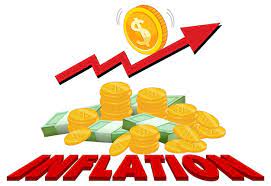What is Inflation? Understanding the Basics and Its Impact on the Economy
Inflation is a term that is often heard in discussions about the economy, but what does it really mean? In simple terms, inflation refers to the increase in prices of goods and services over time. It is a crucial economic concept that affects individuals, businesses, and governments alike. In this article, we will explore the fundamentals of inflation, its causes, effects, and its impact on the overall economy.
Table of Contents
- Introduction to Inflation
- Types of Inflation
- Causes of Inflation
- Measuring Inflation
- Effects of Inflation
- Impact of Inflation on the Economy
- Managing Inflation
- Conclusion
- FAQs
1. Introduction to Inflation
Inflation occurs when there is a sustained increase in the general level of prices for goods and services in an economy. It means that the purchasing power of money decreases over time, as more money is required to buy the same amount of goods or services. Inflation is typically measured by calculating the percentage increase in the Consumer Price Index (CPI) or the Producer Price Index (PPI).

2. Types of Inflation
There are different types of inflation that can occur in an economy. The most common types include:
Demand-Pull Inflation: This type of inflation happens when aggregate demand exceeds the available supply of goods and services. It often occurs during periods of strong economic growth and can lead to a rise in prices.
Cost-Push Inflation: Cost-push inflation occurs when there is an increase in production costs, such as wages or raw material prices. The increased costs are then passed on to consumers, resulting in higher prices.
Built-In Inflation: Built-in inflation refers to the inflationary expectations of workers and businesses. If people expect prices to rise in the future, they may demand higher wages or increase their prices, leading to a self-fulfilling prophecy of inflation.
3. Causes of Inflation
Inflation can be caused by various factors. Some of the main causes include:
Money Supply: When there is an increase in the money supply in the economy, it can lead to inflation. If there is too much money chasing too few goods, prices tend to rise.
Demand-Side Factors: Factors such as increased consumer spending, government expenditure, or foreign demand for exports can also contribute to inflation. When demand exceeds supply, prices rise.
Supply-Side Factors: Changes in production costs, such as wages, energy prices, or raw material costs, can also lead to inflation. If the cost of producing goods and services increases, businesses may pass on those costs to consumers.
4. Measuring Inflation
To measure inflation, economists use various indices, such as the Consumer Price Index (CPI) and the Producer Price Index (PPI). These indices track the changes in prices of a basket of goods and services over time. By comparing the current prices with a base period, inflation rates can be calculated.
5. Effects of Inflation
Inflation can have several effects on individuals, businesses, and the economy as a whole:
Reduced Purchasing Power: As prices rise, the purchasing power of money decreases. People may need to spend more to maintain their standard of living.
Uncertainty and Planning: Inflation can create uncertainty for businesses and individuals in planning for the future. It becomes challenging to forecast costs, prices, and profits accurately.
Income Redistribution: Inflation can redistribute income and wealth within society. People on fixed incomes, such as retirees, may struggle to keep up with rising prices, while those with assets like real estate or stocks may benefit.
6. Impact of Inflation on the Economy
Inflation can impact the overall economy in several ways:
Interest Rates: Central banks often use interest rates to control inflation. Higher inflation may lead to higher interest rates, which can affect borrowing costs for businesses and individuals.
Investment and Savings: Inflation can influence investment decisions and savings rates. High inflation rates may discourage long-term investments and encourage spending rather than saving.
International Competitiveness: High inflation can reduce a country’s competitiveness in international markets. It may lead to higher export prices and lower demand for domestically produced goods.
7. Managing Inflation
Central banks and governments play a vital role in managing inflation. They use monetary policy tools, such as adjusting interest rates or controlling the money supply, to keep inflation under control. Governments also implement fiscal policies and regulations to manage inflationary pressures.
Here is the list of countries with high inflation rates as of 2023:
- Zimbabwe – 284.94%
- Venezuela – 210%
- Sudan – 154.91%
- Turkey – 73.13%
- Argentina – 72.37%
- Sri Lanka – 48.19%
- Suriname – 47.56%
- Yemen – 43.85%
- Iran – 39.99%
- Ethiopia – 33.64%
- Moldova – 28.48%
- Ghana – 27.18%
- Haiti – 26.82%
- Sierra Leone – 25.91%
- Angola – 21.69%
- Estonia – 21%
- Ukraine – 20.55%
- Nigeria – 18.91%
- Malawi – 18.45%
- Lithuania – 17.61%
These inflation rates represent the annualized percentage increase in the general price level of goods and services in each respective country. High inflation can have various economic and social implications, including reduced purchasing power, increased costs of living, and instability in the economy. It’s important for governments and central banks to implement effective monetary and fiscal policies to address inflationary pressures and maintain price stability.
Conclusion
Inflation is a complex economic phenomenon that affects individuals, businesses, and governments. It erodes the purchasing power of money and has wide-ranging effects on the economy. By understanding the causes, types, and impacts of inflation, individuals and policymakers can make informed decisions to manage its effects and ensure economic stability.
FAQs
1. How does inflation impact the average consumer? Inflation can reduce the purchasing power of consumers, leading to higher costs for goods and services. It may require individuals to spend more money to maintain their standard of living.
2. Can inflation ever be beneficial for the economy? Inflation, within reasonable limits, can stimulate economic growth by encouraging spending and investment. However, high and unpredictable inflation rates can have negative consequences.
3. How does inflation affect investments? Inflation can impact investments by reducing the real rate of return. Investors need to consider inflation when making investment decisions to ensure their returns outpace the rate of inflation.
4. How do central banks control inflation? Central banks use various tools, such as adjusting interest rates or controlling the money supply, to manage inflation. They aim to keep inflation within a target range to maintain price stability.
5. Is deflation the opposite of inflation? Yes, deflation refers to a sustained decrease in the general price level of goods and services. It is the opposite of inflation and can have its own set of economic challenges.

